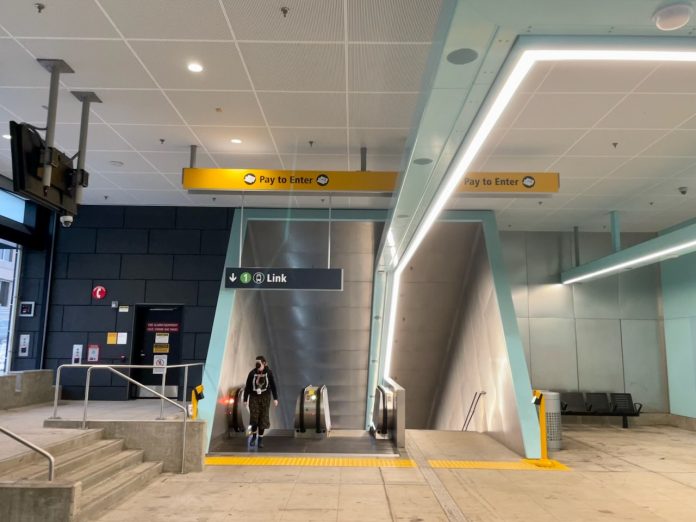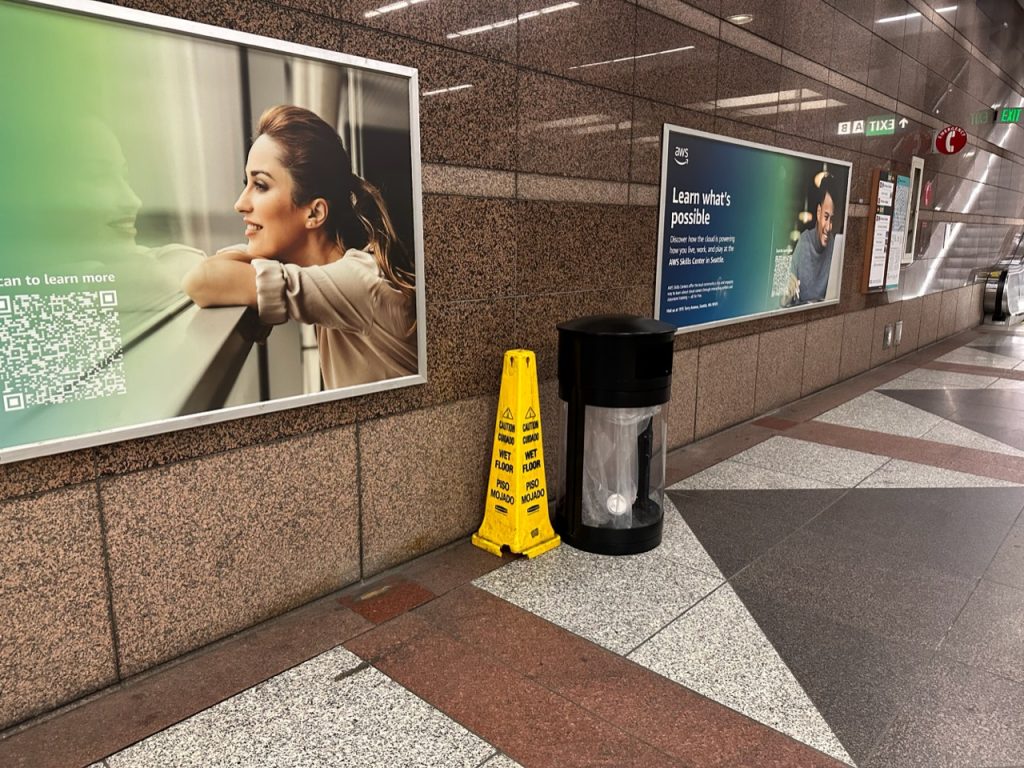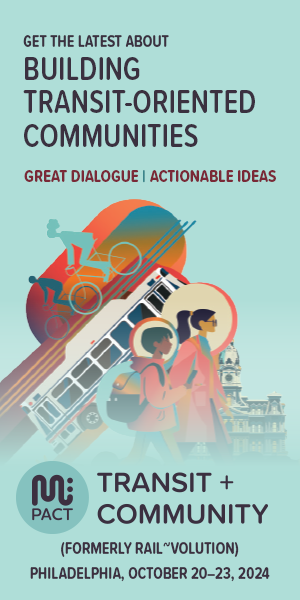A one-time deep clean at Link stations headlines the hygiene.
Cleaning at some Sound Transit facilities are set to see an improvement. A newly approved contract amendment with MSNW Group, a third-party janitorial services provider, will enhance service at a slate of agency-operated facilities, including parking garages, Sounder, Tacoma Link, and ST Express. The contract may also provide a limited one-time cleaning of Link 1 and 2 Line light rail facilities. The 2 Line (East Link) appears poised to open in 2025.
Presley Morrissey, Director of Facilities Operations Support, briefed a Sound Transit committee in May on why the agency was pursuing a contract modification.
“The scope of services has changed dramatically over the last four years and increased services were required to prioritize rider experience,” Morrissey said. “Changes in operating conditions since 2019…include adding cleaning services to 10 facilities in the portfolio, inflation and cost of living wage increases, significant increases in on-call and unplanned services due to vandalism, biohazards, and facility abuse.”
Morrissey shared some photos of facility abuses that have generated extra on-call services for cleanup.
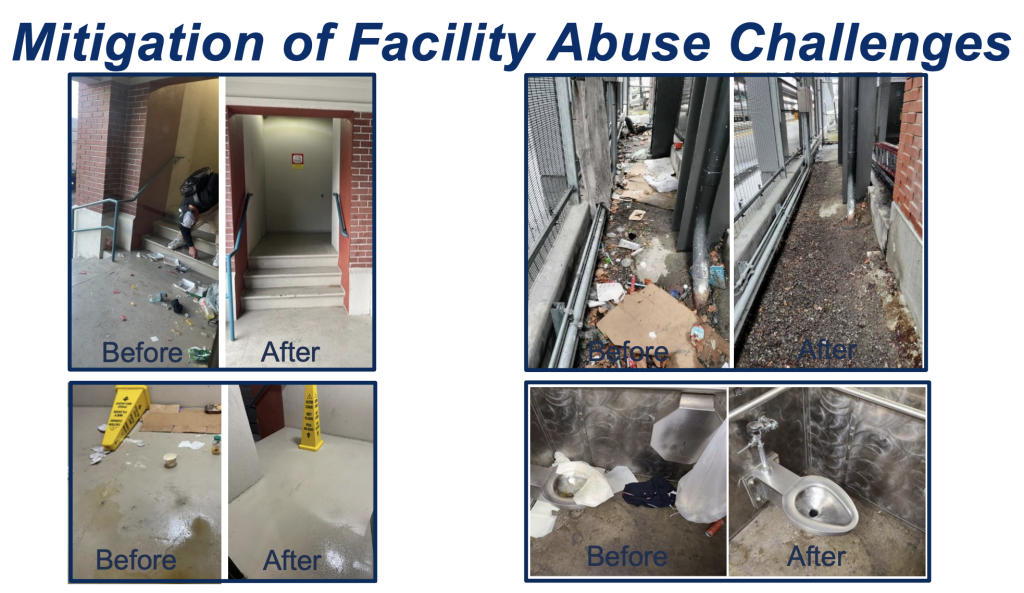
“To mitigate the unplanned on-call service requests, we have modified the scope of the contract by increasing scheduled services throughout our portfolio,” Morrissey said. “The janitorial contract provides comprehensive janitorial services for office spaces, employee work areas, and passenger-facing facilities. This contract provides both regular scheduled services and on-call services to respond to requests that present outside of regular scheduled service times.”
The contract modification with MSNW Group increases funding by $6.8 million for the final year of a five-year contract that expires after May 2024. That brings the total contract to $14.8 million. The base contract had only originally contemplated $8 million in janitorial services cost.
On-call services have quadrupled since 2019 and are expected to top $190,000 this year, but fall somewhat next year. According to Morrissey, “On-call service increases were primarily due to spikes in vandalism, biohazards, drug use, and facility abuse.” That’s raised the general cleaning services scope in the contract, essentially bringing up the ongoing cleaning costs baseline. That category has seen rapid cost increases from $18,000 in 2020 to an estimated $764,000 this year and could top $910,000 next year.
Since 2020, labor costs have seen big jumps across all industries due to inflation. The cleaning industry is no different and thus MSNW Group has been passing those on in this contract. That’s forcing Sound Transit to pay an added $1.1 million in the modified contract. The single biggest contract cost increase, however, is the expansion of nine new service sites. That will reach over $2 million in added costs to the full-term contract with budgetary impacts quickly rising this year and next at $737,000 and $910,000, respectively.
Overall, contract revisions will allow for continued increases in cleaning scope and frequency. That means extra days of service and several extra day porters at various sites.
“Our goal is to provide clean facilities that meet the needs of our passengers,” Morrissey said, “We remain committed to this objective and will continue to prioritize providing safe and clean facilities that meet the expectations of our passengers.”
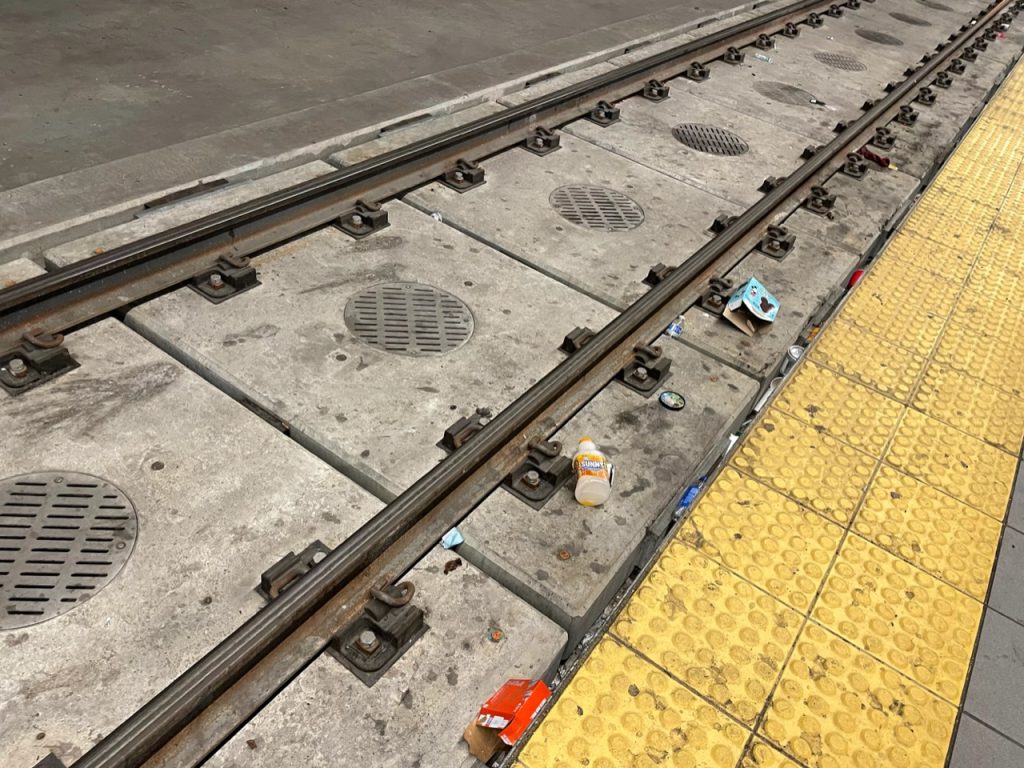
Suraj Shetty, Sound Transit’s head of operations, suggested that the contract modification could benefit Link facilities, which are supposed to be cleaned and maintained by King County Metro.
“In this amendment, we’re asking for money to be set aside in case we need it for the 1 Line, the East Link the starter line, and a potential one-time deep clean,” Shetty said. “But we are in discussions with our King County colleagues to understand what they can provide to meet our passengers needs and making sure we have the financial element second in case we need to act on it and get cleaning done.”
The modified contract has $1.1 million set aside to carry out special cleanings of the Link facilities in the next year.
To Metro’s credit, the agency has been doing a much better job of maintaining stations in the Downtown Seattle Transit Tunnel (DSTT) in recent months. But at non-DSTT stations, vandalism, rubbish, and residues are accumulating at a fast pace. Some of the newest stations already look like they’re decades-old and often appear unmaintained. Part of that may be due to the lack of platform bins in the non-DSTT tunnel stations, but that doesn’t fully explain the difference.
Perhaps special cleanings by MSNW Group will help the agencies catch up. But there’s also a chance that deeper issues are at play. The bottom line is that Metro isn’t providing enough cleaning and maintenance services outside of the DSTT, and given the agency’s inability to hire sufficient staff, Sound Transit may need to begin looking elsewhere to contractors that can.
Stephen is a professional urban planner in Puget Sound with a passion for sustainable, livable, and diverse cities. He is especially interested in how policies, regulations, and programs can promote positive outcomes for communities. With stints in great cities like Bellingham and Cork, Stephen currently lives in Seattle. He primarily covers land use and transportation issues and has been with The Urbanist since 2014.


